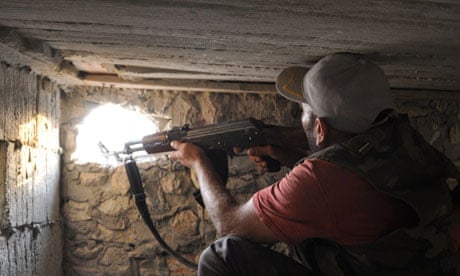Scores of foreign jihadists have crossed into Syria from Turkey in the past two weeks, some of them telling Syrians that they are planning to travel to Aleppo to join a decisive battle against regime troops.
Syrian residents and a Turkish smuggler interviewed by the Guardian say many of the men have come from the Caucasus, while others had arrived from Pakistan, Bangladesh and Gulf Arab states.
According to locals who have dealt with them, the new arrivals embrace a global jihadist worldview that sets them apart from most leaders in the armed Syrian opposition and is stirring deep discontent among the rebel leadership.
Rebel leaders inside Syria say about 15-20 foreign fighters have been crossing each day since mid-July, trying to join up with an estimated 200-300 foreigners in Syria.
"There have been Tunisians, men from Uzbekistan too and from Pakistan," said the smuggler. "They say the Syrians are brothers and that they are going to help them."
Some of the new arrivals have told local people they will also try to connect with a small number of homegrown Syrian groups in the country who at least partly share their ideology and who fought against US forces in Iraq.
The Syrians' journeys to Iraq during the height of the Sunni insurgency from 2004-07 had proved instructive in the violence in Iraq's Anbar province, which borders eastern Syria. And their border crossings had been facilitated by the Syrian regime's security apparatus, which had also acted as a conduit for arriving foreign fighters.
A former adviser to senior ministers within the Iraqi administration said: "There were two aspects to the Syrian efforts in Iraq. First there was their obvious support for the old Iraqi Baathists and then there was the evidence of people coming across and being caught. The intelligence showed strongly that they could not have done so without the help of the Syrian regime."
One Syrian veteran of the Iraq war said: "The brothers who came to join us (in Iraq), particularly from the Maghreb, all flew into Damascus airport and were directed to the border by the intelligence services.
"They crossed the borders the same way that we did. The intelligence officers were responsible for the crossings."
Almost 18 months into the Syrian uprising, the spectre of the Syrian veterans of the Iraq war has loomed large in a series of clashes in the north of the country, particularly in the past two weeks as both sides have been braced for the showdown in Aleppo.
Rebel leaders fear the recent arrivals also adds an unwanted dimension to the Syrian uprising, which was inspired by the popular revolts that ousted entrenched old orders elsewhere in the Arab world but has since evolved into violent insurrection.
Ever since the first signs of revolt in the southern Syrian city of Deraa, regime officials have cast the instability as a plot by such jihadist groups, backed by western and gulf states.
Now, as the once impregnable fortress of state power in Syria starts to erode, the prophecy is partly being fulfilled – to the annoyance of many rebel leaders who say that they will fight the new arrivals if they try to impose themselves.
"The regime said [the uprising] was always about Islamists," said Abu Manaf, a rebel major from Idlib. "It wasn't then and it isn't now. This was a street uprising, just as it was elsewhere."
Free Syria Army officials in southern Turkey say there are at least four groups not aligned to them who are fighting regime forces, a Libyan guerilla brigade among them, although the actual number is likely to be higher.
The groups have been especially active in detonating roadside bombs against regime targets – skills they had learned in Iraq. Prominent are groups such as Jibhat al-Nusra and Ahrar al-Sham, who have acknowledged that they adhere to aspects of the al-Qa'ida worldview.
"They are with us, but for the wrong reasons," said one officer of the Free Syria Army. "They see this war as something bigger than Syria. They are 'takfiris'."
The term 'takfiri' has become associated with an offshoot of the salafist movement, which condones violence to achieve ideological goals. Many of its practitioners embrace the teachings of al-Qa'ida which sees taking the fight to non-Muslims – and especially non-Islamic regimes – as a divine struggle – or jihad.
Global jihadists have begun to focus on Syria for several reasons, firstly because the country is ruled by a clan dominated by the Alawite sect – which is seen as a heretic offshoot of Shia Islam.
In addition, Syria's Muslim Brotherhood movement, which is drawn from fundamentalist Sunni Islamic teachings, has unfinished business with the regime, more than 30 years after former president Hafez al-Assad ordered a brutal crackdown on an uprising in Hama, which killed an estimated 20,000 people.
The jihadist push into Syria, though limited for now, comes as the al-Qa'ida affiliated Islamic State of Iraq has heralded a summer offensive, which last week killed more than 100 people in a day of attacks. The general in charge of the intelligence division in Iraq's Interior Ministry, Hussein Ali Kamal, said jihadists in Iraq were clearly drawing strength from the instability in Syria.
"They used to come to Iraq from Syria and now they are going the other way," he said. "The Syrians created these routes and now they are being used against them. The Syrian regime has a long history with al-Qa'ida. We have taken evidence of their complicity to them directly.
"The situation is very dangerous regionally and we must defeat it. They have in part created the situation that they are now suffering from."
